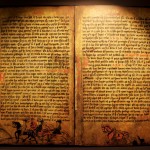It is often said that the Bible is the all-time bestselling book, but it achieved that status in a much earlier publishing era. What would happen if the Bible were submitted as a new book to a publisher today? I imagined how an editor trained in today’s publishing realities might respond to it:
Dear Writer:
I have read your manuscript that you are calling “The Bible,” and I wanted to offer you a little feedback before I inform you of our decision about whether to publish. I admit that I didn’t read all of it, and I frankly doubt that most of your readers would either. I mean, it’s looo-o-ong. Do you know the attention span of the average reader today? Will anyone have the patience for this book?
Not only is it long, but the subject matter is rather diffuse, to say the least. This book has poetry, history, biography, theology, prophecy, parables, hymns, proverbs, and probably a few other genres I’m forgetting. Doesn’t that seem a bit—overwhelming? Who is your audience?

Not to nitpick, but I also have a little trouble understanding your organizational structure. For instance, do you really want to put that hymn book right there in the middle? 150 songs? And those sections you call Matthew, Mark, Luke and John. Aren’t those a little repetitive? Have you thought of just combining those into one?
I don’t mean to discourage you, but I wouldn’t be surprised if quite a few readers are offended by this book. It can be a little polarizing. It’s so violent, for one thing. Stonings, crucifixions, wars, a flood, a woman turned into a pillar of salt. For goodness sake, children may read this! And what about that story where the woman drives the tent peg through the man’s temple while he’s sleeping.? I mean, come on!
I haven’t even mentioned all the details about the animal sacrifices. And what’s with all those lists of rules in some of those beginning sections? That part you call Leviticus has more information about skin diseases than I ever wanted to know. Gack! And while I’m at it, those genealogies slow down the pace of the manuscript a bit, don’t they? What’s your strategy there?
I’m not denying that your book contains inspiring stories. It is filled with timeless truths. It presents a vast overview of God’s plan of salvation for humanity. It holds the key to eternal life. It contains passages that continue to preoccupy me long after I set them aside. I continue to be moved by the words and actions of Jesus. I am inspired by the stories of Abraham, Moses, David, Elijah, Jonah, Ruth, Mary, Paul, and others.
But I don’t know. Our readers today might have a tough time with it. I’m afraid I’m going to have to turn it down. It does not fit our publishing needs at this time.
Sincerely,
The Editor
Comments 5
I really liked this post, it was good deal of fun. I would have definitely shared it widely had it dove a little more into the character of the editor and left out a little of the Christian-speak. I thinking of this line in particular “It presents a vast overview of God’s plan of salvation for humanity. It holds the key to eternal life” All in all a fun read though, thanks!
Insightful and provocative. I think the issue goes beyond the concept of publishing a text and enters into the realm of authorship and enduring quality. There are probably clear reasons why certain texts, movies, even songs endure throughout generations. I have had this discussion with others and it seems that writers in particular, are able to recognize excellence that transcends mediocrity. It would be interesting to discover other ideas regarding enduring quality.
Author
Yes, it really is about authorship and the mystery of the power of certain works, particularly the Bible. I teach at writers conferences and read a lot about the “rules” of good writing in various genres, and the Bible breaks most of those rules. Its power is beyond question, but it doesn’t follow any model in use today. It transcends today’s publishing categories. I wouldn’t recommend it as a model for a writer trying to get published, but I would recommend it for the truth it contains.
Dr. Bentz,
I found this post incredibly interesting to read! This is a subject I have often thought about as I am considering pursuing further studies within theology and Biblical studies. I think that one of the main problems we face as a culture is lack of understanding of how the Bible relates to Christians–both past and present–and what our role in interpreting and responding to the word of God should be. In many cases, I think we greatly underestimate how difficult the Bible is to read well, and more so, to understand at an appropriate level.
Thank you for your thoughts, I really enjoyed this.
I just find this scenario to be hilarious, because the editor is rejecting the work of forty one collaborators, one of them being God.
I feel like the Bible would be considered very post modern as a book (as difficult as post-modernism is to pin down). Imagine this: you’re reading Malachi, and then all of a sudden, you are transported 400 years later, starting with a random genealogy of some guy named Jesus. What is the significance of the different details in each of the Gospel accounts? Why are there random numbers everywhere? What the heck is the symbolism of Revelations?